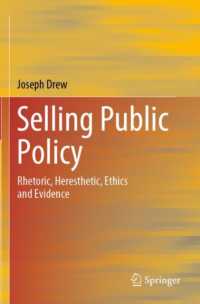Full Description
In recent decades, some of the most celebrated and culturally influential American oratorical performances have come not from political leaders or religious visionaries, but from stand-up comics. Even though comedy and satire have been addressed by rhetorical scholarship in recent decades, little attention has been paid to stand-up. This collection is an attempt to further cultivate the growing conversation about stand-up comedy from the perspective of the rhetorical tradition. It brings together literatures from rhetorical, cultural, and humor studies to provide a unique exploration of stand-up comedy that both argues on behalf of the form's capacity for social change and attempts to draw attention to a series of otherwise unrecognized rhetors who have made significant contributions to public culture through comedy.
Contents
SECTION I: THE RHETORICAL POTENTIALS OF STAND UP
1. Late Night Apologia: A Critical Analysis of David Letterman's October 1st, 2009 On-Air Revelation-Confession - Casey R. Schmitt (collection co-editor)
2. Rhetoric of Racial Ridicule in an Era of Racial Protest: Don Rickles, the "Equal Opportunity Offender" Strategy, and the Civil Rights Movement - Raúl Pérez
3. What's the Deal with Liberals?: The Discursive Construction of Partisan Political Identities in Conservative Stand-Up Comedy - Ron Von Burg & Kai Heidemann
4. The Comedic Prince: The Organic Intellectualism of Bill Hicks - Aaron Duncan & Jonathan Carter
5. When Can Rape Be Funny?: The Limits of Dark Humor and the Rhetoric Daniel Tosh's Rape Joke - Christopher Medjesky
6. "Would You Want Your Sister to Marry One of Them?" Whiteness, Stand-Up and Lenny Bruce - Matthew R. Meier (collection co-editor) & Chad M. Nelson
RESPONSE: Stephen Olbrys Gencarella, University of Massachusetts Amherst
SECTION II: STAND-UP AS A SITE OF INTERVENTION AND SOCIAL CHANGE
7. "No Damn Mammy, Moms!" Rhetorical Re-invention in the Stand-up Comedy of Jackie "Moms" Mabley - Abbey Morgan
8. Teasing the Funny: Native American Stand-Up Comedy in the 21st Century - Amanda Morris
9. "You Gotta Get Chinky with It!": Margaret Cho's Rhetorical Use of Humor to Communicate Cultural Identity - Lacy Lowrey & Valerie Renegar
10. If Laughs Could Kill: Eddie Izzard and the Queer Art of Comedy - Christopher Gilbert
11. Humor as an Activist Style: Dick Gregory and the Civil Rights Movement - Jonathan P. Rossing
12. Louis C.K.'s "Weird Ethic": Kairos and Rhetoric in the Network - Jim Brown
RESPONSE: Alberto González, Bowling Green State University
CONCLUSION: [To be titled] - Joanne Gilbert, Alma College
INDEX







